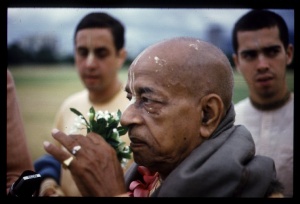CC Madhya 20.70: Difference between revisions
m (1 revision(s)) |
(Vanibot #0054 edit - transform synonyms into clickable links, which search similar occurrences) |
||
| (One intermediate revision by one other user not shown) | |||
| Line 1: | Line 1: | ||
{{ | [[Category:Sri Caitanya-caritamrta - Madhya-lila Chapter 20|C070]] | ||
<div style="float:left">'''[[Sri Caitanya-caritamrta|Śrī Caitanya-caritāmṛta]] - [[CC Madhya|Madhya-līlā]] - [[CC Madhya 20|Chapter 20: Lord Śrī Caitanya Mahāprabhu Instructs Sanātana Gosvāmī in the Science of the Absolute Truth]]'''</div> | |||
<div style="float:right">[[File:Go-previous.png|link=CC Madhya 20.69|Madhya-līlā 20.69]] '''[[CC Madhya 20.69|Madhya-līlā 20.69]] - [[CC Madhya 20.71|Madhya-līlā 20.71]]''' [[File:Go-next.png|link=CC Madhya 20.71|Madhya-līlā 20.71]]</div> | |||
{{CompareVersions|CC|Madhya 20.70|CC 1975|CC 1996}} | |||
{{RandomImage}} | |||
==== TEXT 70 ==== | ==== TEXT 70 ==== | ||
<div | <div class="verse"> | ||
bhadra karāñā tāṅre gaṅgā-snāna karāila | :bhadra karāñā tāṅre gaṅgā-snāna karāila | ||
śekhara āniyā tāṅre nūtana vastra dila | :śekhara āniyā tāṅre nūtana vastra dila | ||
</div> | </div> | ||
| Line 12: | Line 16: | ||
==== SYNONYMS ==== | ==== SYNONYMS ==== | ||
<div | <div class="synonyms"> | ||
bhadra | ''[//vanipedia.org/wiki/Special:VaniSearch?s=bhadra&tab=syno_o&ds=1 bhadra] [//vanipedia.org/wiki/Special:VaniSearch?s=karāñā&tab=syno_o&ds=1 karāñā]'' — making gentle; ''[//vanipedia.org/wiki/Special:VaniSearch?s=tāṅre&tab=syno_o&ds=1 tāṅre]'' — him; ''[//vanipedia.org/wiki/Special:VaniSearch?s=gaṅgā&tab=syno_o&ds=1 gaṅgā]-[//vanipedia.org/wiki/Special:VaniSearch?s=snāna&tab=syno_o&ds=1 snāna]'' — bathing in the Ganges; ''[//vanipedia.org/wiki/Special:VaniSearch?s=karāila&tab=syno_o&ds=1 karāila]'' — caused to do; ''[//vanipedia.org/wiki/Special:VaniSearch?s=śekhara&tab=syno_o&ds=1 śekhara]'' — Candraśekhara; ''[//vanipedia.org/wiki/Special:VaniSearch?s=āniyā&tab=syno_o&ds=1 āniyā]'' — bringing; ''[//vanipedia.org/wiki/Special:VaniSearch?s=tāṅre&tab=syno_o&ds=1 tāṅre]'' — to him; ''[//vanipedia.org/wiki/Special:VaniSearch?s=nūtana&tab=syno_o&ds=1 nūtana]'' — new; ''[//vanipedia.org/wiki/Special:VaniSearch?s=vastra&tab=syno_o&ds=1 vastra]'' — clothing; ''[//vanipedia.org/wiki/Special:VaniSearch?s=dila&tab=syno_o&ds=1 dila]'' — delivered. | ||
</div> | </div> | ||
| Line 19: | Line 23: | ||
==== TRANSLATION ==== | ==== TRANSLATION ==== | ||
<div | <div class="translation"> | ||
Candraśekhara then made Sanātana Gosvāmī look like a gentleman. He took him to bathe in the Ganges, and afterwards he brought him a new set of clothes. | Candraśekhara then made Sanātana Gosvāmī look like a gentleman. He took him to bathe in the Ganges, and afterwards he brought him a new set of clothes. | ||
</div> | </div> | ||
| Line 26: | Line 30: | ||
==== PURPORT ==== | ==== PURPORT ==== | ||
<div | <div class="purport"> | ||
The words bhadra karāñā are significant in this verse. Due to his long hair, mustache and beard, Sanātana Gosvāmī looked like a daraveśa, or hippie. Since Śrī Caitanya Mahāprabhu did not like Sanātana Gosvāmī’s hippie features, he immediately asked Candraśekhara to get him shaved clean. If anyone with long hair or a beard wants to join this Kṛṣṇa consciousness movement and live with us, he must similarly shave himself clean. The followers of Śrī Caitanya Mahāprabhu consider long hair objectionable. | The words ''bhadra karāñā'' are significant in this verse. Due to his long hair, mustache and beard, Sanātana Gosvāmī looked like a ''daraveśa'', or hippie. Since Śrī Caitanya Mahāprabhu did not like Sanātana Gosvāmī’s hippie features, he immediately asked Candraśekhara to get him shaved clean. If anyone with long hair or a beard wants to join this Kṛṣṇa consciousness movement and live with us, he must similarly shave himself clean. The followers of Śrī Caitanya Mahāprabhu consider long hair objectionable. | ||
Sanātana Gosvāmī was saved from a hellish condition (Mahāraurava) by the grace of Śrī Caitanya Mahāprabhu. Mahāraurava is a hell wherein animal killers are placed. In this regard, refer to Śrīmad-Bhāgavatam ([[SB 5.26.10-12]]). | Sanātana Gosvāmī was saved from a hellish condition (Mahāraurava) by the grace of Śrī Caitanya Mahāprabhu. Mahāraurava is a hell wherein animal killers are placed. In this regard, refer to [[Srimad-Bhagavatam|''Śrīmad-Bhāgavatam'']] ([[SB 5.26.10|5.26.10-12]]). | ||
</div> | </div> | ||
__NOTOC__ | |||
<div style="float:right; clear:both;">[[File:Go-previous.png|link=CC Madhya 20.69|Madhya-līlā 20.69]] '''[[CC Madhya 20.69|Madhya-līlā 20.69]] - [[CC Madhya 20.71|Madhya-līlā 20.71]]''' [[File:Go-next.png|link=CC Madhya 20.71|Madhya-līlā 20.71]]</div> | |||
__NOTOC__ | |||
__NOEDITSECTION__ | |||
Latest revision as of 22:46, 19 February 2024

A.C. Bhaktivedanta Swami Prabhupada
TEXT 70
- bhadra karāñā tāṅre gaṅgā-snāna karāila
- śekhara āniyā tāṅre nūtana vastra dila
SYNONYMS
bhadra karāñā — making gentle; tāṅre — him; gaṅgā-snāna — bathing in the Ganges; karāila — caused to do; śekhara — Candraśekhara; āniyā — bringing; tāṅre — to him; nūtana — new; vastra — clothing; dila — delivered.
TRANSLATION
Candraśekhara then made Sanātana Gosvāmī look like a gentleman. He took him to bathe in the Ganges, and afterwards he brought him a new set of clothes.
PURPORT
The words bhadra karāñā are significant in this verse. Due to his long hair, mustache and beard, Sanātana Gosvāmī looked like a daraveśa, or hippie. Since Śrī Caitanya Mahāprabhu did not like Sanātana Gosvāmī’s hippie features, he immediately asked Candraśekhara to get him shaved clean. If anyone with long hair or a beard wants to join this Kṛṣṇa consciousness movement and live with us, he must similarly shave himself clean. The followers of Śrī Caitanya Mahāprabhu consider long hair objectionable.
Sanātana Gosvāmī was saved from a hellish condition (Mahāraurava) by the grace of Śrī Caitanya Mahāprabhu. Mahāraurava is a hell wherein animal killers are placed. In this regard, refer to Śrīmad-Bhāgavatam (5.26.10-12).